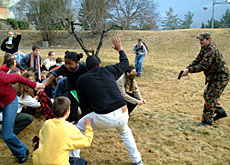
Students learn rules of refugee game

As Switzerland marks National Refugee Day, the reality and hardship faced by asylum seekers is being hammered home to Swiss students.
Workshops where pupils “experience” war, oppression and exile are being conducted in classrooms in the German-speaking part of the country.
“It doesn’t help anyone, neither the Swiss nor the refugees, to neglect one section of society,” Kais Fguiri of the Federal Foreigners Commission told swissinfo
Teachers launched the programme following last year’s nationwide vote on Switzerland’s asylum policy.
The initiative by the right-wing People’s Party called for a tightening of asylum procedure and was only narrowly defeated.
This week the party announced plans to ballot the country once again over the issue.
Deep scars
November’s vote left deep scars in German-speaking Switzerland, where many cantons – including cosmopolitan Zurich – supported the initiative.
During the political debate genuine asylum seekers found themselves portrayed as criminals.
Teachers realised that their students, knowing little about the lives of refugees, were accepting this point of view.
The Swiss Refugee Council (SRC) is now going into schools to try to reverse the trend.
“Since the narrow defeat of the People’s Party’s initiative, demand from schools has rocketed,” said Jean-Daniel Fivaz of the SRC.
Role play
During special workshops, students get to take on the role of an asylum seeker to help them understand what refugees go through when they come to Switzerland.
“The participants have to realise that a refugee hasn’t just left their country,” said Fivaz. “They have to join a new culture, leave their old lifestyles behind.”
Since the beginning of the year, 40 such sessions have been run in German-speaking cantons. “People have realised it’s time to speak up,” Fivaz told swissinfo.
Adults are also taking part, including trainee police officers, students from technical universities and managers from Switzerland’s civil protection agencies.
So far, around 30,000 people across the country have attended the special workshops.
“It’s essential for these people to understand the multicultural environment in which they are supposed to work,” said Jean-Daniel Müller, one of the SRC’s programme directors.
Hard facts
While the role-playing game attempts to give participants an idea of the emotions felt by an asylum seeker, the second part of the workshop is all about hard facts.
They learn about Switzerland’s admission policies, in particular how difficult it is to become a recognised refugee.
They also find out that Switzerland has granted refugee status to just 26,000 people and that between two and ten per cent of all asylum requests are accepted each year.
Asylum seekers receive just SFr15 per day for food and clothing – far less than a Swiss receiving social security.
Participants in the workshops are also reminded that asylum seekers cannot work for their first three months in Switzerland and can then only take a job that nobody else wants.
swissinfo, Anne Rubin (translation: Scott Capper)
26,000 people have been granted refugee status in Switzerland.
Between two and ten per cent of asylum seekers are granted refugee status each year.
An asylum seeker gets SFr15 per day for food and clothing, less than a Swiss person on social security.
Around 50 million people worldwide have been forced to flee their homes, according to the UN’s High Commissioner for Refugees.

In compliance with the JTI standards
More: SWI swissinfo.ch certified by the Journalism Trust Initiative



























You can find an overview of ongoing debates with our journalists here . Please join us!
If you want to start a conversation about a topic raised in this article or want to report factual errors, email us at english@swissinfo.ch.